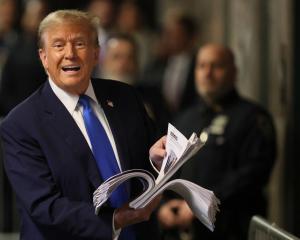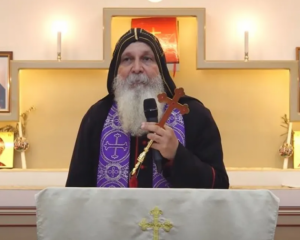
Trump, taking questions from reporters in the lobby of Trump Tower in New York, reverted to his initial comments on Saturday blaming "many sides" for the violence, but on Monday had explicitly condemned the Ku Klux Klan, neo-Nazi and white supremacist groups.
"They came at each other with clubs ... it was a horrible thing to watch," Trump told reporters at what was supposed to be an announcement and news conference on his administration's infrastructure policy. He said left-wing protesters "came violently attacking the other group."
Trump has faced a storm of criticism from Democrats and members of his own Republican Party over his initial response to the violence around the rally in the Southern college town. His remarks on Tuesday began a new round of outrage.
"Blaming 'both sides' for #Charlottesville?! No. Back to relativism when dealing with KKK, Nazi sympathizers, white supremacists? Just no," Republican Representative Ileana Ros-Lehtinen said on Twitter.
White supremacists in the United States have been emboldened by the election of Trump. His campaign last year drew their support and that of other right-wing groups, despite his disavowals of them.
"Thank you President Trump for your honesty & courage to tell the truth about #Charlottesville & condemn the leftist terrorists in BLM/Antifa," former Ku Klux Klan leader David Duke wrote on Twitter after Trump's latest remarks, referring to Black Lives Matter (BLM) and anti-facists.
Saturday's violence erupted after hundreds of white nationalists converged in Charlottesville to protest plans to remove a statue of General Robert E. Lee, commander of the pro-slavery Confederate army in the US Civil War.
In his remarks, Trump sympathised with protesters who opposed removing the Robert E. Lee statue in Charlottesville, but offered no equivalent remarks for those who favored its removal.
"You had people in that group ... that were there to protest the taking down of a very, very important statue and the renaming of a park from Robert E. Lee to another name."
Trump grouped former presidents George Washington and Thomas Jefferson, who fought to create the United States, together as "slave owners," with southern leaders Lee, Jefferson Davis and Stonewall Jackson.
"Was George Washington a slave owner? Will George Washington now lose his status? Are we going to take down statues to George Washington? How about Thomas Jefferson? ... Because he was a major slave owner," Trump said.
In Virginia, street brawls broke out as the white nationalists were met by crowds of anti-racism demonstrators. A car then plowed into a group of the counter-protesters, killing one woman and injuring 19 others.
A 20-year-old Ohio man, James Fields, said to have harbored Nazi sympathies, has been charged with murder, malicious wounding and leaving the scene of a fatal accident.
On Tuesday, Trump explained his initial restrained response by saying: "The statement I made on Saturday, the first statement, was a fine statement, but you don't make statements that direct unless you know the facts. It takes a little while to get the facts."
In a sometimes heated exchange with reporters shouting questions, Trump said, "You also had people that were very fine people on both sides."
He said that while neo-Nazis and white nationalists "should be condemned totally," Trump said protesters in the other group "also had trouble-makers. And you see them come with the black outfits and with the helmets and with the baseball bats. You got a lot of bad people in the other group too."
Trump continyed to lash out at the media, where many commentators said his response to the unrest still rang hollow.
"Made additional remarks on Charlottesville and realize once again that the #Fake News media will never be satisfied...truly bad people!" he said in a tweet.
CNN has been one of the media most targeted by Trump for criticism. On Tuesday morning, he retweeted a cartoon that showed a train labeled "Trump" colliding with a person depicted as CNN and captioned, "Nothing can stop the #TrumpTrain!!" The tweet was deleted shortly afterwards.
CHIEF EXECUTIVES LEAVE ADVISORY PANEL
Trump also hit back at business leaders who quit a presidential advisory panel in protest over his response to the rally, calling the executives "grandstanders."
Three business leaders quit a Trump panel in protest on Monday and on Tuesday, Scott Paul, president of the Alliance for American Manufacturing, said on Twitter he was also resigning "because it is the right thing for me to do."
Wal-Mart Stores Inc chief executive officer Doug McMillon, the biggest private employer in the United States with 1.5 million employees, said he would remain on the council "to help bring people together" but criticized the president. Johnson & Johnson chief executive Alex Gorsky also said he would remain on the panel.
"As we watched the events and the response from President Trump over the weekend, we too felt that he missed a critical opportunity to help bring our country together by unequivocally rejecting the appalling actions of white supremacists," Walmart's McMillon wrote in a note to employees Monday evening.
The note was later posted on a company website and accessible to the public.
Gorsky said in a statement that "...if we aren’t there standing up for our belief in diversity and inclusion, or if we fail to speak out when the situation demands it, then we have abdicated our...responsibility."
Trump bowed on Monday to two days of pressure for a more forceful response, singling out groups behind the "Unite the Right" rally that were widely seen as stoking the disturbances. But he was still clearly frustrated over the reaction to his response.
"For every CEO that drops out of the Manufacturing Council, I have many to take their place. Grandstanders should not have gone on. JOBS!" Trump said on Twitter on Tuesday.
The head of pharmaceutical company Merck & Co Inc, Kenneth Frazier, left the president's American Manufacturing Council in protest on Monday. The chief executives of sportswear manufacturer Under Armour Inc and semiconductor chip maker Intel Corp, Kevin Plank and Brian Krzanich, followed suit later in the day.
On Monday, Trump had struck back at Frazier, saying in a Twitter post that now he had left the panel, the Merck executive would have more time to focus on lowering "ripoff" drug prices.
WEBSITE MOVED
Neo-Nazi website the Daily Stormer, which helped organise the rally, moved on Tuesday to the so-called Dark Web, a portion of the Internet that is not indexed by popular search engines, because its registration to use the open internet was revoked by GoDaddy Inc and Alphabet Inc's Google.
Texas A&M University said in a statement late on Monday that it had canceled a "White Lives Matter" rally scheduled for September 11 on its College Station campus. The event, organised by Preston Wiginton, a prominent white nationalist, had been set to feature white supremacist Richard Spencer as a headline speaker.
The Charlottesville violence appeared to have accelerated a push to remove memorials, flags and other reminders of the Confederate cause. Municipal leaders in cities across the United States have said they will step up efforts to pull Confederate statues from public spaces.












